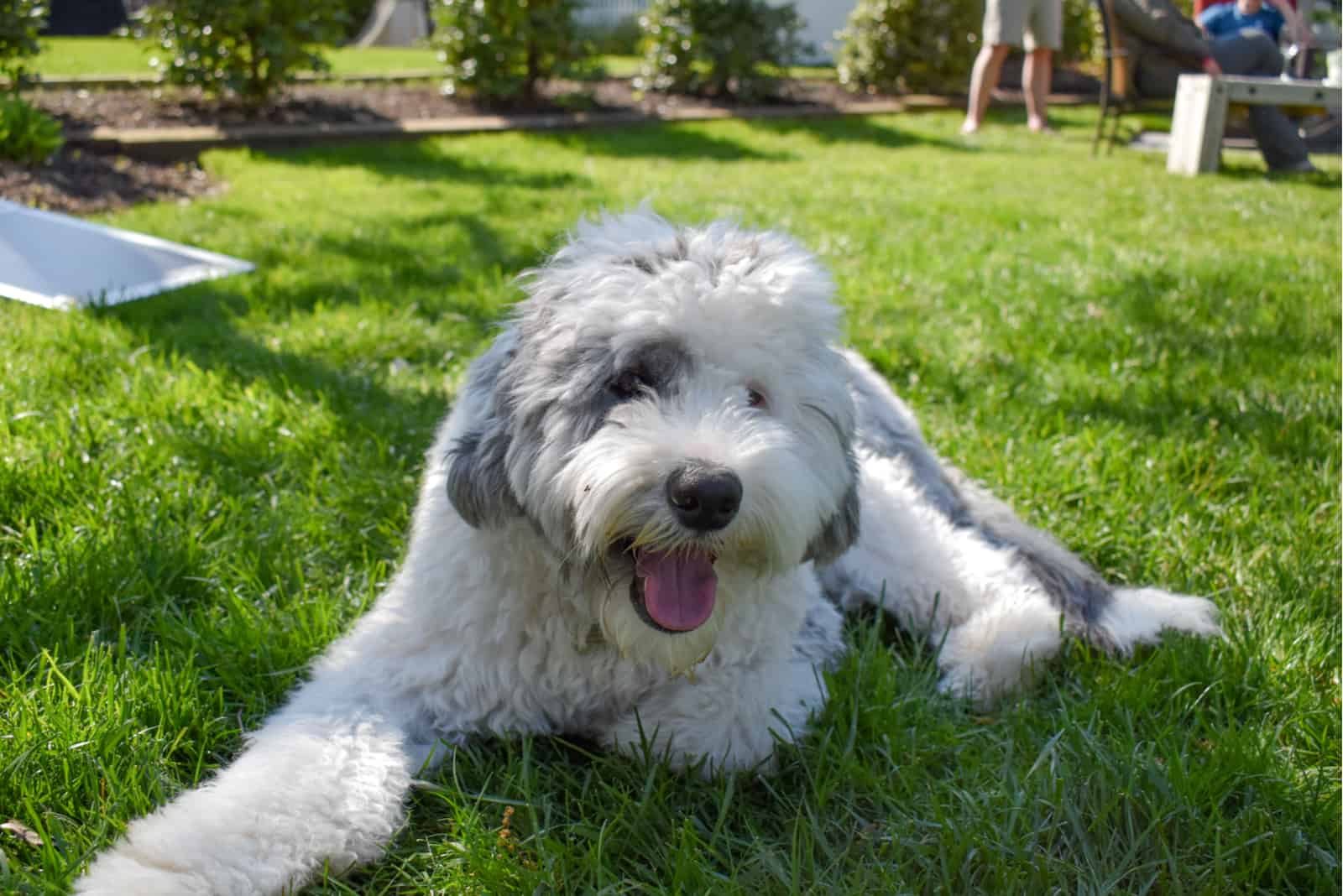In the deep pool of Doodles, one stands out with its size, character, and one-of-a-kind appearance. Meet the Sheepadoodle! This is a lovely cross between the Poodle (of course) and the Old English Sheepdog.
I have to warn you that you shouldn’t mix this dog with a Shepadoodle, which is a GSD and Poodle mix. I know it sounds similar, but the spelling isn’t and the dog isn’t either.
Sheepadoodles can come in three variations depending on the Poodle’s size: medium, mini Sheepadoodle, and micro. Today, we’ll discuss the standard Sheepadoodle as they are much more common than the rest.
You’ll learn how to recognize these pups on the streets. What are they like! And, how do you raise the perfect Sheepadoodle puppy!
Buckle up because we’re going for a shaggy ride.
Meet The Parent Breeds: Old English Sheepdog And Poodle
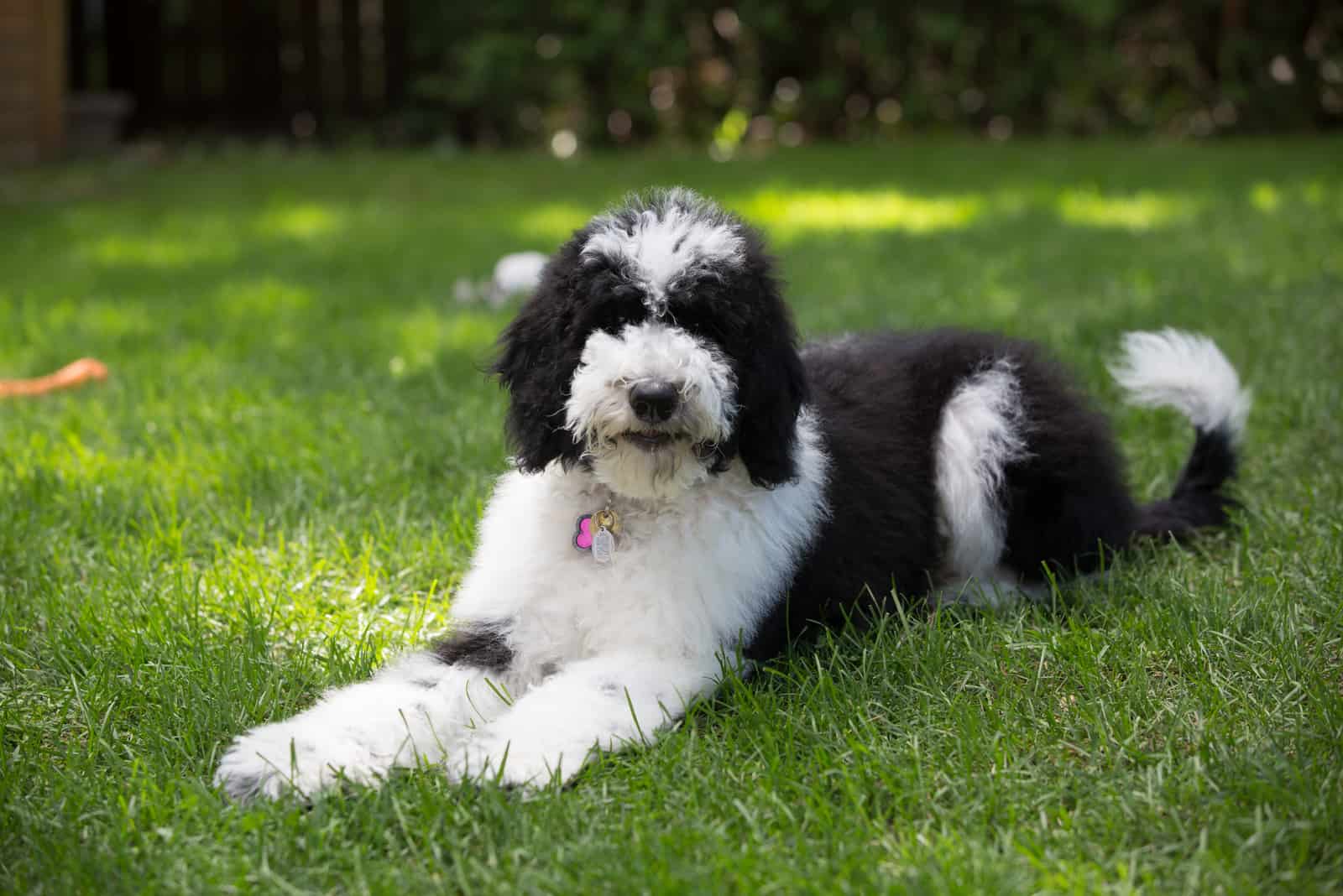
Have you ever seen an Old English Sheepdog? Maybe you’ll recognize them under the names “Old English” or “OES”? Or, maybe you’ll find their thick, shaggy look recognizable?
Be it as it is, the Old English Sheepdog is a large dog breed that stands out in the crowd with its appearance and kind character. The OES is classified as a working dog, precisely one used for herding purposes.
Think of them as gentle giants, weighing up to 100 pounds, and standing tall at around 22″. They can be sweet as needed, and act tough when the situation calls for it.
The Old English Sheepdog has a rather unusual coat type. It doesn’t have curls as you might assume. This dog comes with shaggy hair, usually in shades of blue, gray, merle, and white.
I find them very desirable as their coat is dense and has a sort of water-repellant trait. Even though they’re double-coated, they still don’t shed that much. I know they’re not hypoallergenic, but they’re not half-bad either.
This purebred pooch is a bright spark. They love listening to their humans, following commands, and simply sticking by their sides. Yes, you can say they are velcro dogs!
The OES will adapt to any living condition but one: he doesn’t stand running. This dog sweats, and if you’re a jogger, forget about bringing your pal along on the morning run.
Still, they’re super friendly, calm, and kind, and it doesn’t surprise me that some breeders have figured out that they can make amazing crossbreeds with these doggos.
The other parent breed, the standard Poodle, has an unpopular publicity of being a stuck up dog. I can only say that ignorant people are claiming this. Poodles of all sizes are sweet, loyal, and graceful animals. They aren’t stuck up at all! Maybe quirky, but not stuck up.
Poodles are great and loyal friends. The reason why people love them so much is because they’re original hypoallergenic dogs. All Doodles and other mixes coming from Poodles are therefore considered hypoallergenic, too.
However, there is no such thing as a 100% non-shedding, hypoallergenic dog breed. But, Poodles are pretty close to it. Their curly coat in over 20 colors has no bad odor, the one characteristic of dogs. They’re pleasant to keep inside, even in small apartments.
Our standard Poodle can reach a height of 18 to 24 inches at the withers. They’re also large dogs, weighing 50 to 70 pounds. Medium Poodles, miniature Poodles, and toy Poodles are significantly smaller.
The one thing people dread about Poodles is their high-maintenance and expensive grooming bills. This amazing coat doesn’t come without a price, and a hefty one!
Poodles require frequent brushing, occasional bathing, and overall extra care, especially when it comes to hair cutting. Most dog owners love fashioning their dog’s hairstyle into lovely haircuts, characteristic of this breed.
All in all, Poodles make great family pets. They can be neurotic sometimes, and will get bored easily, but that’s not something you should worry about. Provide lots of interesting toys and go on walks together, and you won’t have to fear separation anxiety when you visit your Poodle.
Sheepadoodles’ Good Looks: How Do You Recognize This Attractive Boy Or Girl?
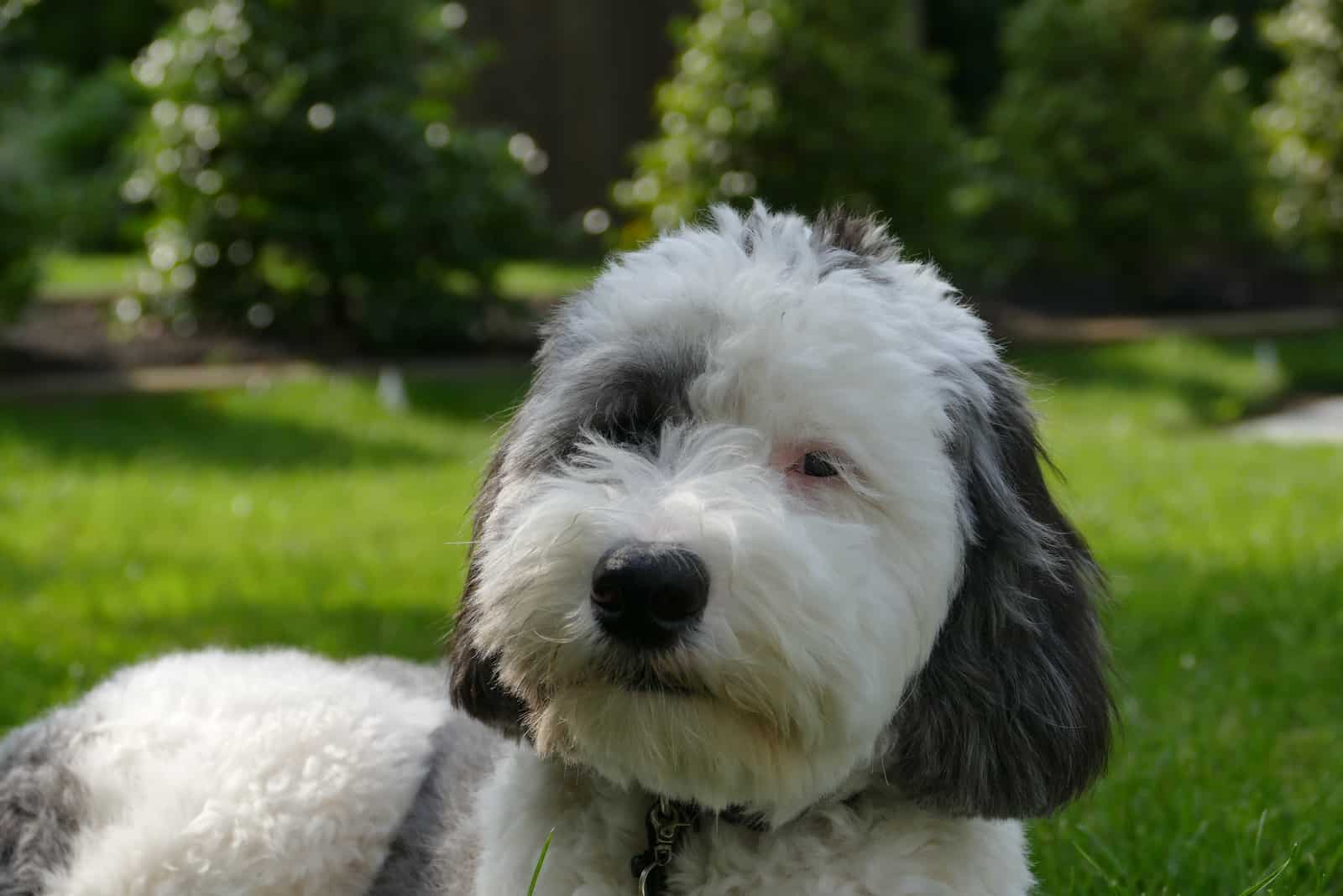
Just like all mixed breed pups, our Sheepadoodle doesn’t have a breed standard that he or she should look up to. Such dogs can resemble either one parent or both of them.
A Sheepadoodle can have its head shaped like the Old English Sheepdog parent, which is square, or dome-shaped, like with Poodles. Still, this dog has a shaggy head and it doesn’t matter if it’s square or dome-shaped.
Sheepadoodles are all alike, meaning their coat color is always a combination of white with black. As they age, these dogs can change color and become grayish-white. As for their rare colors, Sheepadoodle dogs can also come in red and white, but this is quite unusual.
The standard Sheepadoodle is a large dog. They should weigh from 65 to 85 pounds. Their height is proportional to their weight, measuring 18 to 27 inches at the withers. This big body is covered in either curly or straight hair depending on the genesis game.
Your Sheepadoodle will resemble a Poodle or an Old English Sheepdog, but it will also resemble a Bernedoodle. This distant cousin looks very similar to our Sheepadoodle, with its teddy bear appearance, soft and floppy ears, and fluffy coat.
The only apparent thing that sets them apart is the wide variety of colors found with Bernedoodles.
A Sheepadoodle’s coat is a silky, soft, safe place where you can dig your fingers and feel how all the daily troubles go away.
A Sheepadoodle’s Temperament: Are They Feisty Pooches Or Sweet Pups?

If you’re looking for the ideal family dog, then the Sheepadoodle is the dog for you. This pup loves everyone, including young children, and it isn’t afraid to show affection.
Thanks to the OES parent, the Sheepadoodle is an even-tempered dog.
Some pups might inherit quirkiness from the Poodle parent, but even such Sheepadoodles are pretty easy-going. You will easily get along with him since this is one of the friendliest Poodle mixes (as friendly as a Poodle Golden Retriever mix, the Goldendoodle!).
But, don’t expect that your Sheepadoodle will be too mellow, snoozing on the couch all the time. These are energetic doggies.
Their high energy drive will make you get up and do something fun together. Yes, together, because Sheepadoodles love being around people. You will have to include your Sheepadoodle into your daily activities.
Sheepadoodles love attention more than a big, fat bone!
Make sure you acknowledge their presence, give a head pat here, and an ear scratch there if you’re too busy, and your dog won’t feel broken-hearted.
These smart cookies seem as if they understand you. No wonder! With such intelligence, I’m surprised they don’t speak for real!
To put all jokes aside, Sheepadoodles are one of the kindest, friendliest dog breeds you’ll find in the canine world.
A huge bonus is that they’re adaptable and will fit easily into any lifestyle. I know a big house and a spacious yard are the ideal scenario, but even decent-sized apartments will do.
Hey, they might not be approved by the American Kennel Club (AKC), but they’re totally approved by our hearts!
How Easy Is It To Train A Sheepadoodle?
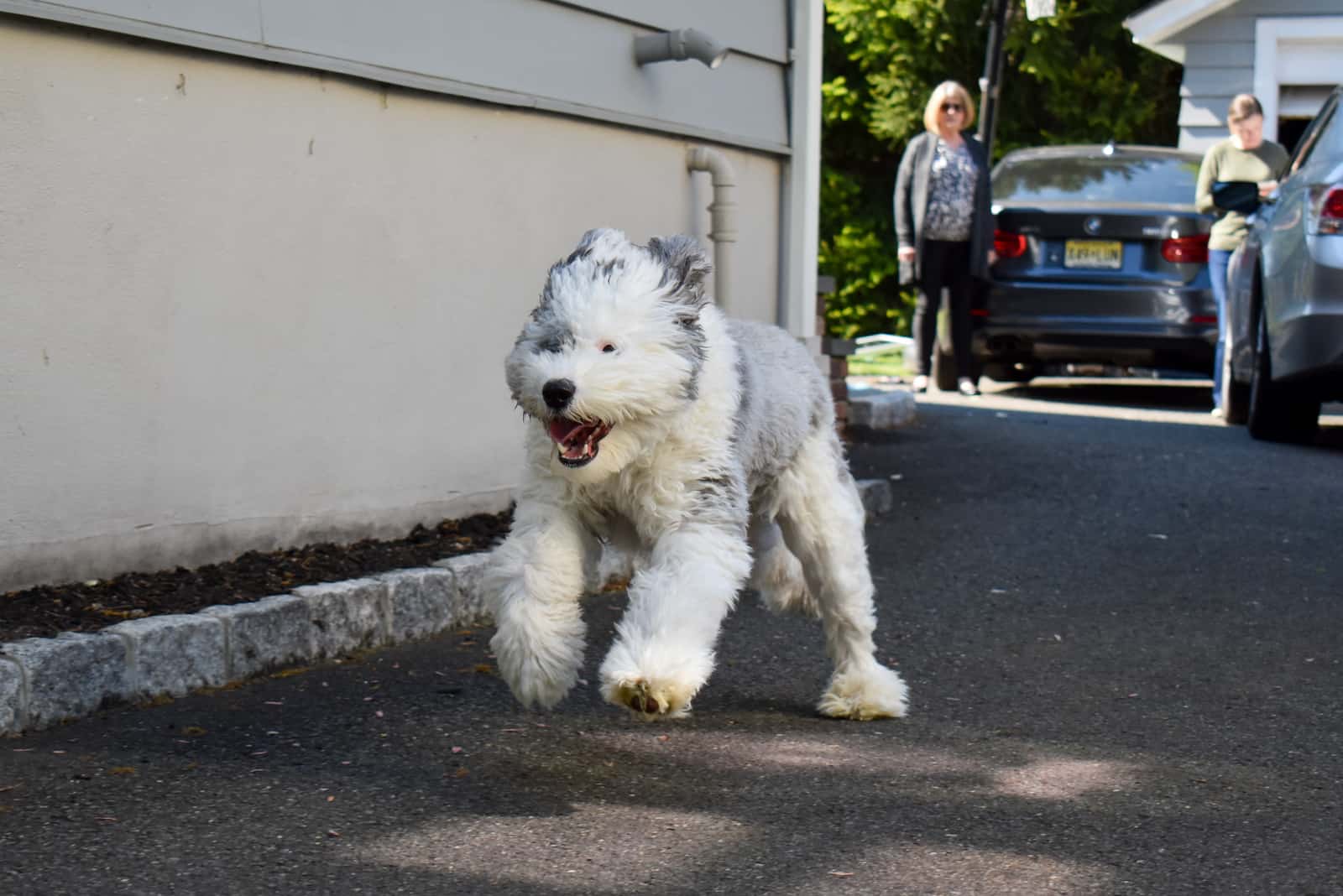
Having such a smart dog can only mean one thing: Sheepadoodles are a delight to train.
Right? Absolutely right!
Sheepadoodles are intelligent pooches (thanks to both parents) and they enjoy fulfilling tasks for their humans. If you say jump, they will most certainly say how high?
No, seriously… Sheepadoodles are patient, waiting for their next commands whether you’re teaching them to go potty or how to walk on a leash.
Every dog shows the best results if trained by using positive reinforcement. Some pups are food-motivated, while some, like the Sheepadoodle, care more for cuddles and praises. See what works for your dog.
I recommend that you don’t leave your Sheepadoodle alone for too long in order to curb boredom. After all, these pups have Poodle genes, and Poodles get neurotic, bored, and destructive in no time. Get some puzzle toys for your pup’s mental stimulation. He won’t notice when the hours go by!
But, they do come with one downside, and that’s their high energy level and herding genes combined into one. To prevent them from herding small animals and kids, you need to submit your Sheepadoodle to early socialization and obedience lessons.
Only a trained Sheepadoodle will forget about its roots and steer away from herding.
Sheepadoodle pups are also great guardians and watchdogs. I know they aren’t as good as Rottweilers, but Sheepadoodles will have one eye on you and the other on potential danger. They find their duty is to keep the entire family feeling safe and loved.
Read Also: Bernedoodle Vs Sheepadoodle: Which Is The Better Dog Breed
Grooming 101: Taking Care Of Your Sheepadoodle
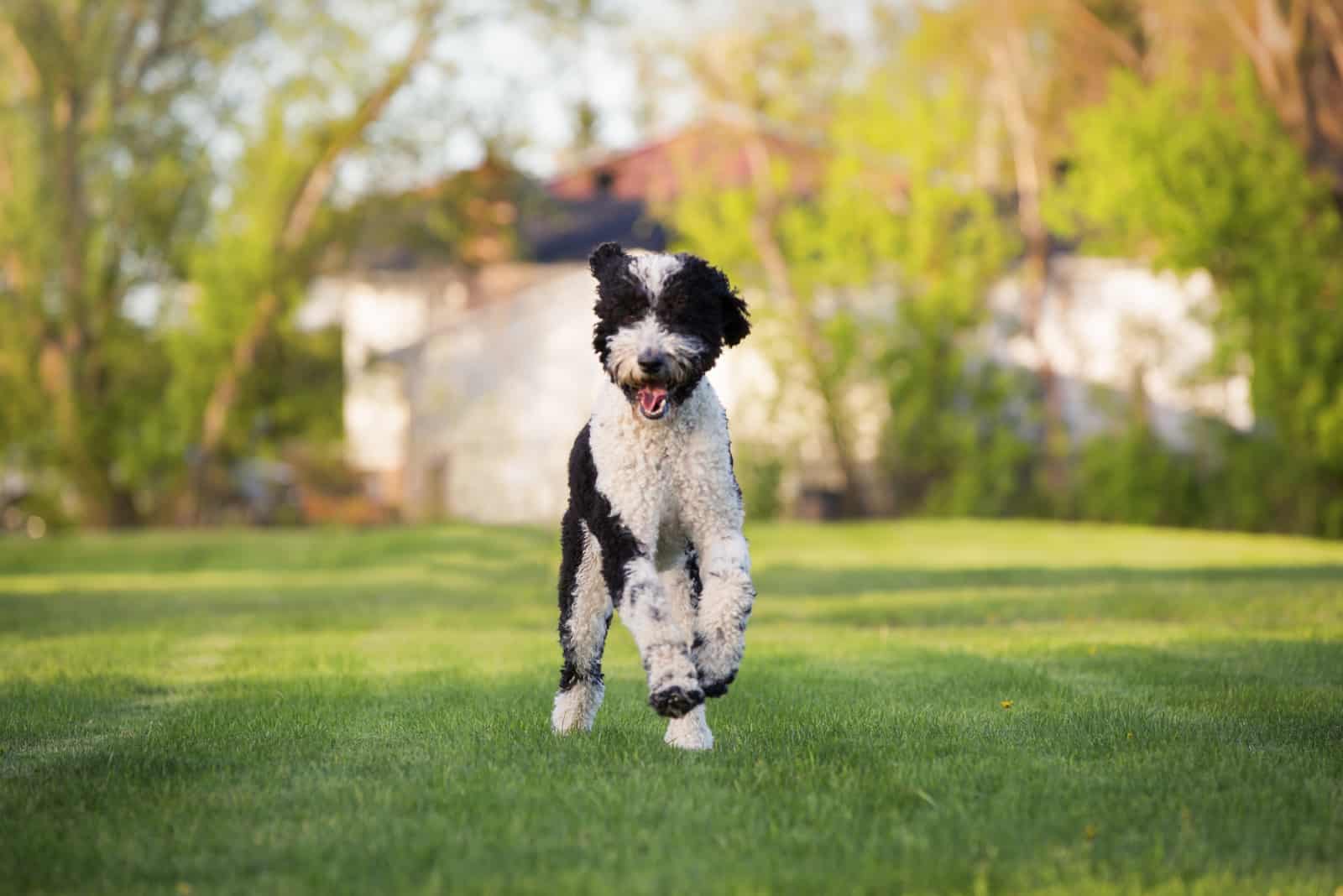
Sheepadoodles are designer dogs coming from Poodles. They must require constant grooming, right? Well, this time you’re wrong. Sheepadoodles are fairly easy to groom and won’t cost you an arm and a leg.
Despite coming from a parent breed that’s notorious for large grooming bills and high-maintenance, Sheepadoodles are absolutely easy to take care of. They don’t have any special demands, and you won’t have to spend hours bringing their coat in order.
As we mentioned earlier, Sheepadoodles are hypoallergenic dogs. Even their first generation is considered hypoallergenic! It only depends on what amount they’ve inherited this trait from the Poodle parent. This means they are low-shedding and clean pups with no odor.
You will need to brush them several times a week to prevent tangles and matting of the coat. With a good brush, you should do this. I always recommend you think of brushing as a way of bonding with your dog. Oh, and start grooming early, so your Sheepadoodle puppy gets used to the idea of someone messing with their hair.
Since this is a double-coated dog, you should know that their undercoat has water-repellant traits. I wouldn’t take my Sheepadoodle swimming or jumping in puddles everyday as it can be quite difficult to dry out their coats.
A wet coat is the ideal ground for bacterial development and possible infections. Avoid that, please!
Besides frequent brushing, you should examine your Sheepadoodle’s ears and eyes for signs of infections, as well as brush its teeth to prevent tartar buildup. What you shouldn’t do frequently is bathing and hair clipping. Every eight to twelve weeks will be just fine.
Do Sheepadoodles Have Any Major Health Problems?
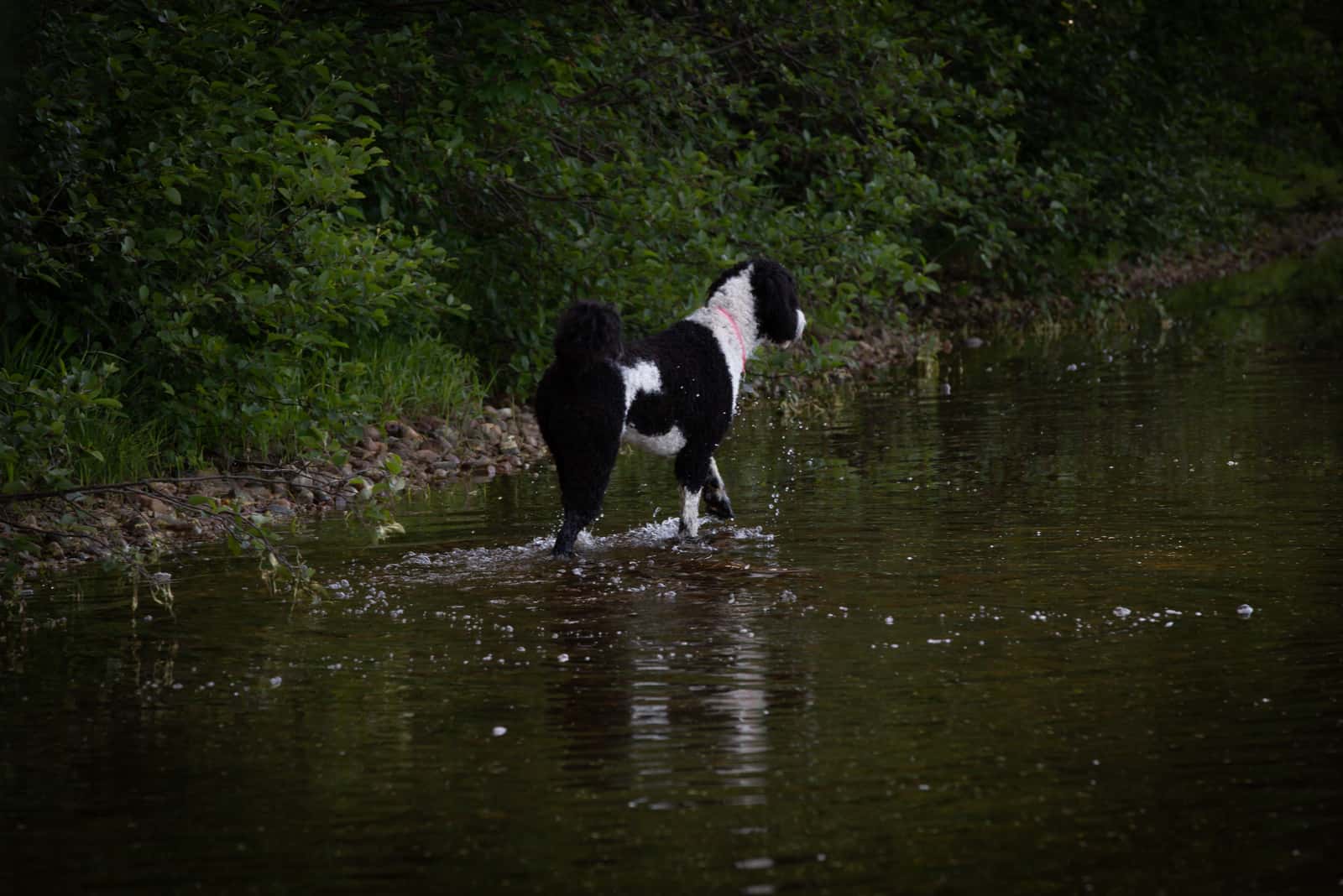
Every dog breed, whether it’s a purebred dog or a designer breed, comes with certain health conditions. It’s natural! If there was a dog without any known health issues, that would be a problem.
This mixed breed dog is considered to have hybrid vigor. But, what exactly is hybrid vigor?
This term represents a dog that has significantly low chances of inheriting some genetic diseases as it comes from parent breeds of different backgrounds. This means such dogs are healthier and more capable of fighting certain health conditions.
An average Sheepadoodle is considered to be a very healthy dog breed. Still, they may suffer from the following conditions:
– Addison’s disease
– Bloat
– Hip dysplasia
– Sebaceous adenitis
– Joint and mobility issues.
All of the mentioned health problems are treatable with medicine or surgery. Always ask your Sheepadoodle breeder about health testings they’ve conducted on the parents and the puppies.
Still, I recommend you take extra care to prevent a condition called bloat. Bloat (or Gastric Dilatation Volvulus) is a common problem with large dog breeds. When the stomach gets too much air, it twists and cuts down blood supply to other organs, leaving the dog to pant, lose consciousness, and die.
Bloat is a severe condition and requires immediate help. But, there are a few tricks you can do to prevent it. More on that in the following section!
What Do Sheepadoodles Eat?
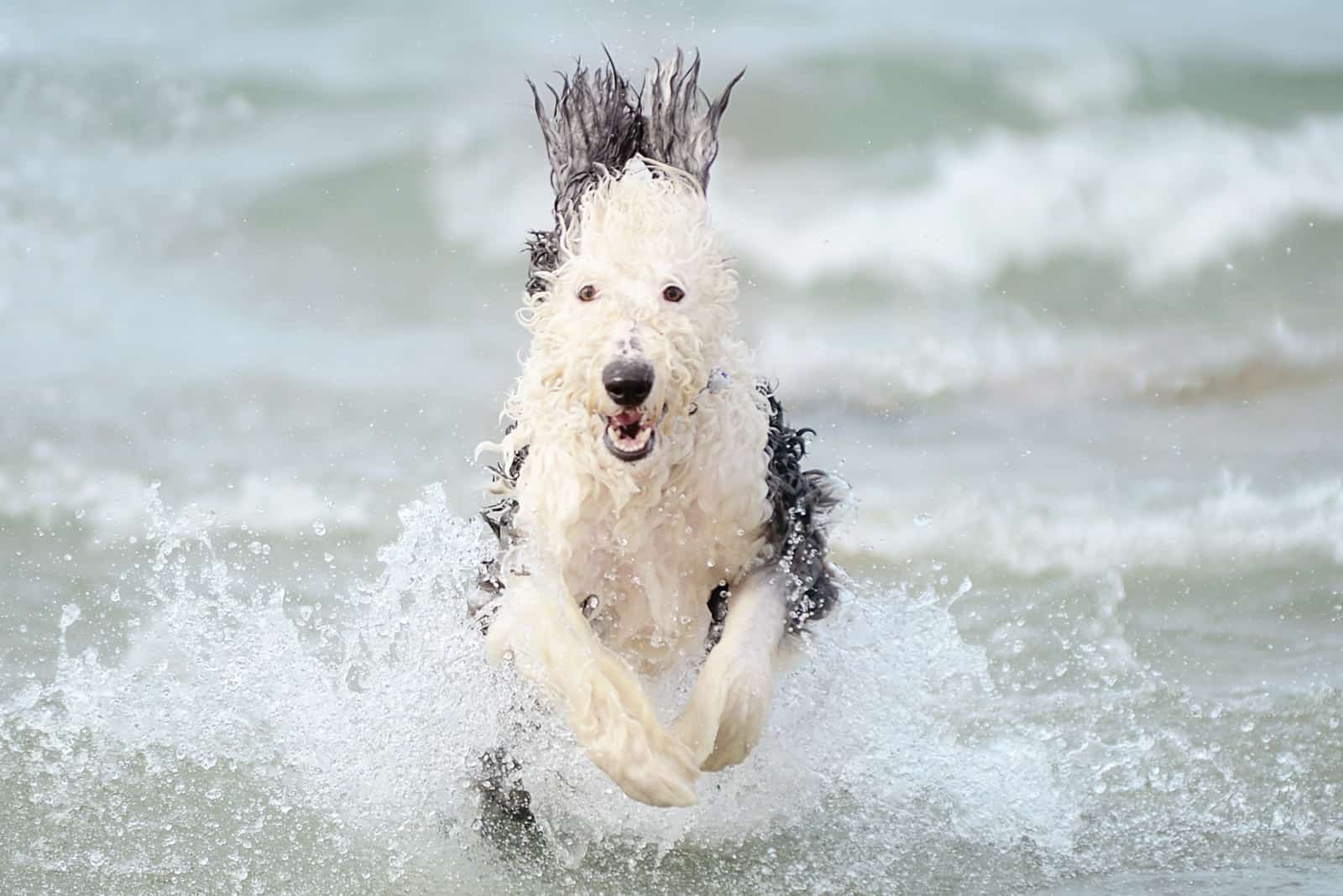
Sheepadoodles aren’t dogs that are necessarily prone to food allergies. However, I still wouldn’t feed them generic dog food. If you consider your dog to be your family member, then you’ll have to provide high-quality kibble.
But, what is high-quality kibble? It’s dog food made primarily by using real animal proteins. It doesn’t contain fillers like soy or grains since dogs can’t digest carbohydrates naturally.
I recommend you find small dog food brands with clear ingredients lists on the back of their packages. Smaller brands are more likely to produce the good stuff, rather than big dog food chains.
Also, I would recommend you do some math and see if you could switch over to raw dog food. Raw food is more expensive and time consuming to prepare, but it brings many benefits to the dog. After all, every canine is a carnivore, and they get used to this regime rather fast.
As you may remember, I addressed the issue of bloat in the previous subheading.
Bloat can be prevented if you reduce your dog’s daily meal to a few smaller ones, for example, three times a day instead of one huge meal. Large dog breeds easily get bloated because of their deep chest.
Don’t let your dog exercise extensively before or after a meal. Control the amount of water he takes after a meal. And, lastly, get a maze food bowl; something to slow your pup down as he noms the delicious stuff.
What’s The Average Lifespan Of This Designer Dog?
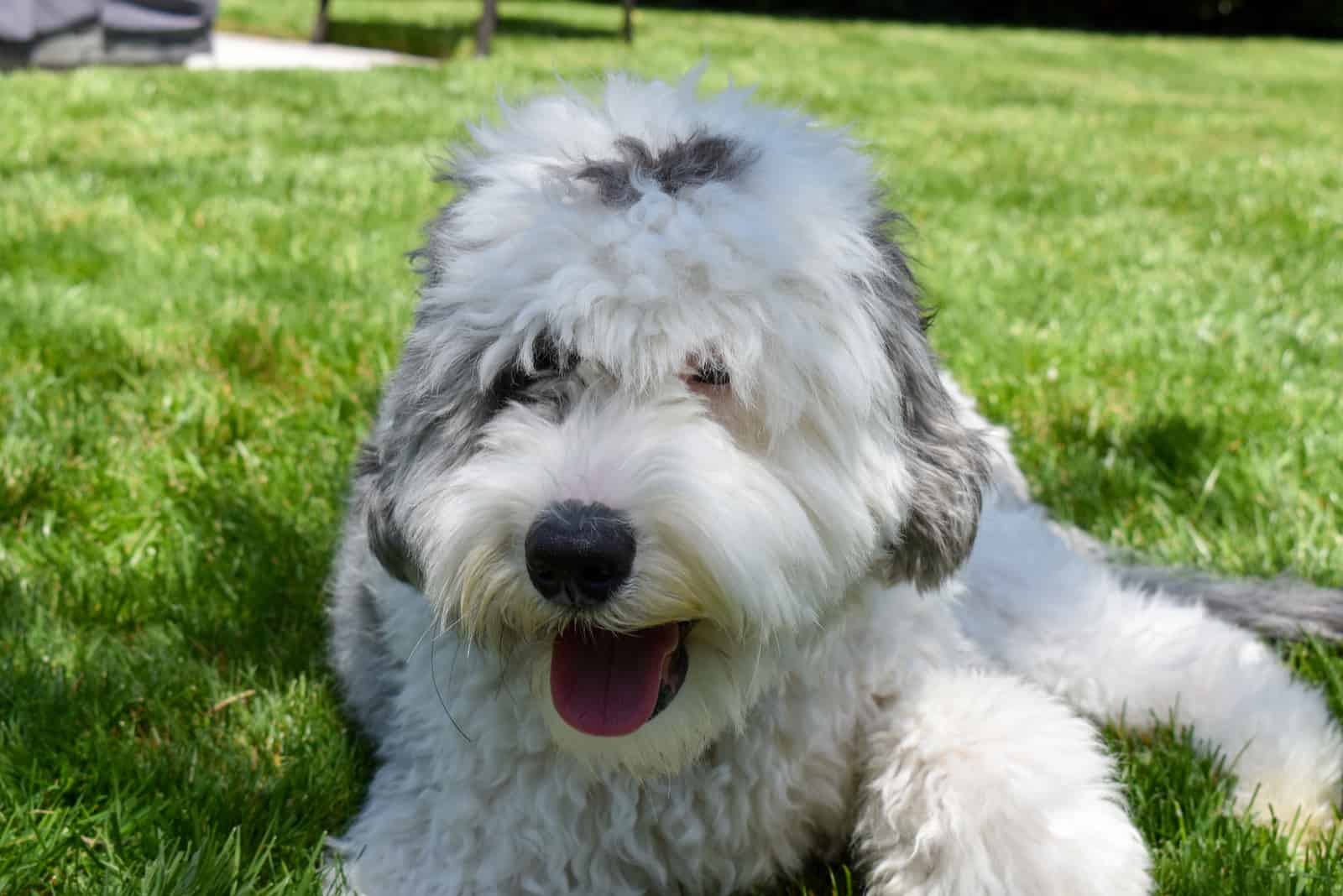
Both parent breeds are known to have a fairly long lifespan. That’s 10 to 12 years for the Old English Sheepdog, and 12 to 15 years for the Poodle.
It’s no surprise that their love puppy, the Sheepadoodle, has an average life expectancy of 11 to 15 years. That’s a lot of years you can spend enjoying your Sheepadoodle’s company.
How Great Are Sheepadoodles With Kids?
I wouldn’t doubt a second whether to bring a Sheepadoodle into a home with kids. These dogs are known for being super gentle and kid-friendly. They love engaging in their playtime, and spending all day together.
But, no matter how trained your dog is, I still recommend you teach your kids that they shouldn’t bother the dog when it’s his alone time, i.e., sleeping or eating.
Show them respect and they will show the same in return.
Top 5 Reasons Why The Sheepadoodle Is For You
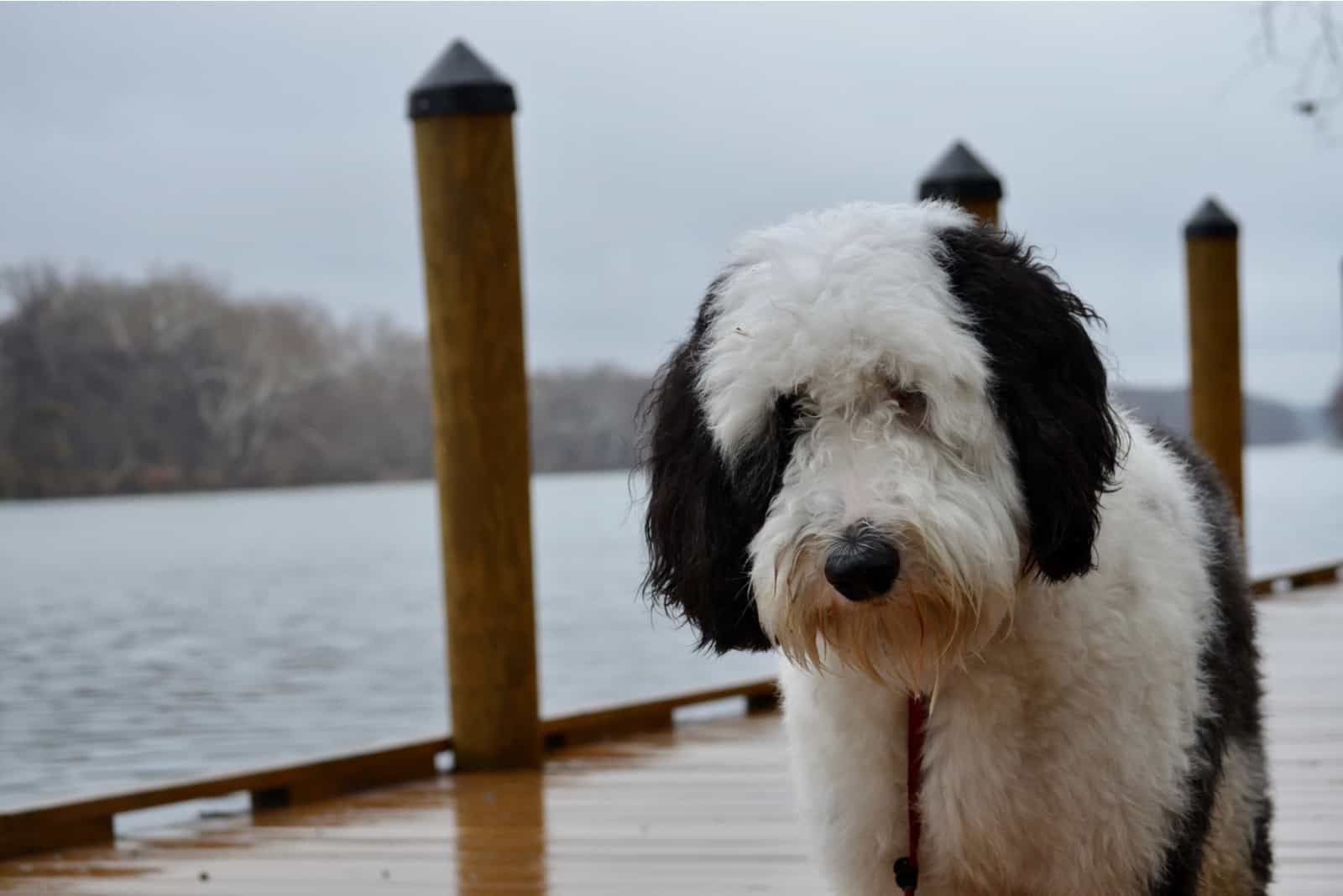
Before getting any dog breed, I recommend you sit down with your family and make a list of pros and cons about that specific dog breed. Every dog has its own flaws no matter how sweet he is. But, for now, let’s focus on the good side of owning a Sheepadoodle.
First off, Sheepadoodles are low shedders. This is a huge bonus for everyone, not only allergic people.
As low shedders, Sheepadoodles are also considered hypoallergenic since they come from Poodles. Their tight, shaggy coat catches loose dander, which is the #1 allergy trigger. Thus, living with these pups is a delight.
Sheepadoodles are intelligent dogs, not only thanks to the Poodle, but to the Old English, too! They make training simple and enjoyable as they learn fast and make no room for disobedience.
Besides being intelligent, Sheepadoodles are sociable dogs, looking forward to any human interaction. They not only do well with humans, but kids love them, too, as well as other pets. Still, it’s crucial to have them socialized like any other dog breed.
The reason why they get along so fine with other people must be because Sheepadoodles are super friendly. They won’t bark at intruders or show aggression. Sheepadoodles are generally pleasant dogs to own, and they make one of the best pets.
Lastly, it’s their lifespan that makes you say: I wanna own a Sheepadoodle. Many cross breeds don’t have a lifespan this long like our Sheepadoodle. 11 to 15 years sounds simply amazing!
Top 5 Reasons Why The Sheepadoodle Isn’t For You
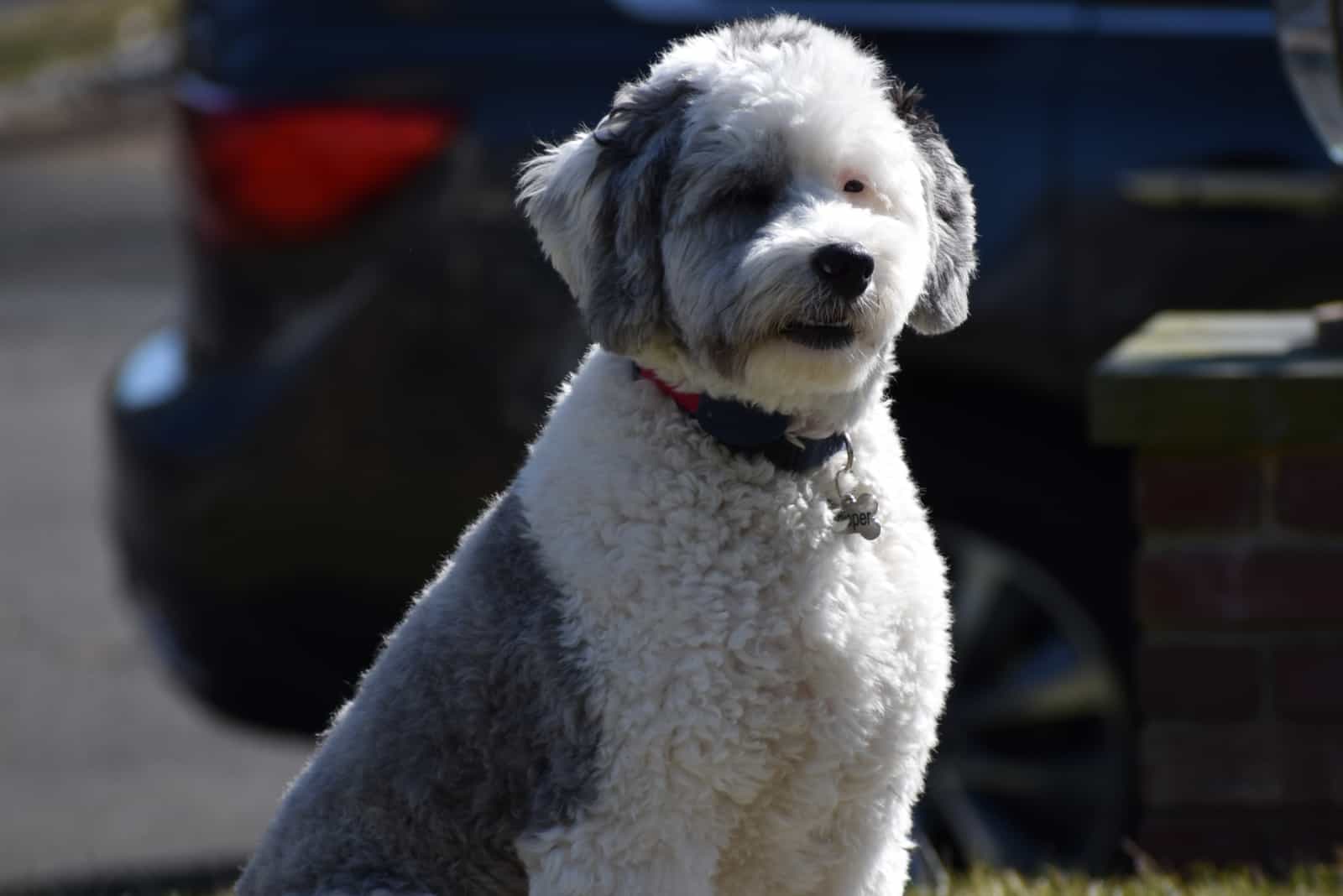
And now, for the bad side of owning a Sheepadoodle…
Even though their sociable character is a pro, I must say it’s a con, too. Such dogs attach to humans quickly and will require constant attention, even when you go outside without them.
If you don’t give them something to do, Sheepadoodles will turn to destruction, and even develop separation anxiety.
Next, their grooming sessions can get tiring, especially during the shedding season. Taking your dog to the groomer is expensive, but grooming at home takes your time. You have to see which option works the best for you.
Sheepadoodles don’t do well in extremely hot conditions. They prefer living somewhere with a pleasant climate. The reason behind this preference is their chunky coat, making them sweat under the slightest pressure.
These dogs can be chewers, but once you socialize them, you shouldn’t have any issue with this behavior.
Lastly, I have to warn you that a Sheepadoodle’s herding instinct might kick in sometimes and he’ll try to herd you and your kids. Train to prevent such things!
What’s The Verdict? How Awesome Are Sheepadoodles?
A Sheepadoodle is simply… PAWMAZING!
This lovely cross is considered to be a designer dog, let’s say, a more fancy way to address a mixed-breed pooch. And, I have to say that the term “designer” truly matches them.
Sheepadoodles come in unique coat patterns. They’re beyond sweet, caring, and friendly.
I wouldn’t doubt a second whether to get one. Okay, I would need to expand my house as they require some space, but other than that, I have nothing on them.
Sheepadoodles are truly remarkable dogs, and I feel their time is yet to come.
Read Next: 11 Best Sheepadoodle Breeders In Ontario
